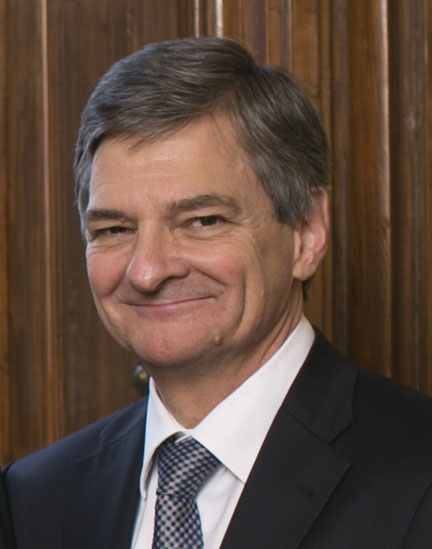Ryerson University could be home to the Canada’s newest law school.
A year after the launch of the English Law Practice Program, its executive director Chris Bentley confirms the school is conducting an internal consultation as to whether it will launch its own law school.
 As reported in the school’s student newspaper The Ryersonian last week, interim president Mohamed Lachemi is backing the proposal and confirmed a feasibility study has begun.
As reported in the school’s student newspaper The Ryersonian last week, interim president Mohamed Lachemi is backing the proposal and confirmed a feasibility study has begun.
Bentley says between the LPP and the recently launched Legal Innovation Zone, Ryerson has shown it has a lot to contribute to the legal sector.
“It’s entirely consistent with Ryerson’s determination to lead. There is a great opportunity for an institution, and Ryerson is the perfect one, to lead an innovative approach to legal education and build something that’s not been built before,” says Bentley.
Bentley says following the internal consultation an external proposal would have to go to the Federation of Law Societies of Canada, the Law Society of Upper Canada, and the Ontario government. The FLSC has to give its approval to any new law school, LSUC then has to give its stamp of approval, and the province would have to agree to the funding.
“There is a ways to go here,” says Bentley. “However, Ryerson has a unique way of establishing the goal and making sure they reach it.”
Bentley, a former Ontario attorney general, acknowledges criticism about too many law school grads not being able to find articling positions or jobs after articling. But, he adds, the need is to address how legal education is being delivered.
“If you’re going to meet the needs of the 21st century you can’t be using the same approach to education we used decades ago,” he says. “One of the challenges we have in the legal profession is we are using time-honoured approaches and thinking they alone are going to be enough, and they’re not.”
Ryerson's model might address one of the issues the Canadian Bar Association's touched on in its Futures Report in terms of teaching the next generation of lawyers differently, says Fred Headon, past president of the CBA and chairman of the Legal Futures Initiative.
"In the Futures Report we certainly say there is need for new ways of teaching law and given Ryerson's past approaches of how to teach this could be very exciting," says Headon. "They certainly have been innovators in education and this could be a very interesting development."
Headon noted other new law schools have positioned themselves in light of the markets they are in, such as Lakehead University in Northwestern Ontario and Thompson Rivers University in British Columbia.
"I think other schools are looking at how to help graduates find their way to some career that is sustainable, such as some of the things the University of Calgary has done," he says.
"I think that would be something Ryerson will hopefully consider as it develops its proposal is where might they be able to best help their graduates find their new careers."
While some argue there are too many law grads seeking too few articling positions and ultimately jobs, University of Ottawa law professor and former dean Bruce Feldthusen says there is an “untapped demand” for places in law school, so why not have those spots filled here in Canada rather than abroad.
“The last time I checked the stats, we had between 800 and 1,000 lawyers who obtained degrees outside Ontario applying to be admitted to the bar in Ontario. The majority were Ontario residents who had not been able to get into law school in Ontario and therefore had gone offshore,” he says.
Foreign law schools are expensive and yet people go there when they can’t get into Canadian law schools, he notes.
“It’s not irrational what is being proposed from that point of view.”
Feldthusen says it is prejudicial to poorer students in Ontario and to first-generation Canadians if their only alternative is to leave the country.
“I’m not sure why we want to give that market for legal education to foreign providers,” he says.
However, he acknowledges the practice of law has slowed in the last decade and applications to law school have dropped.
“It’s a more complicated question than it appears on the surface. Whenever I hear people saying they want to roll back enrollment in Ontario I say that gap would be immediately filled by offshore providers.”
Bentley says a law school at Ryerson would be “something you haven’t seen before” and “enormously attractive” not only to students but prospective employers.
“What we found with the Law Practice Program is that we’ve been able to place 220 candidates, who successfully completed our training, in a very challenging market and this year we will have the same number to place and we will find placements for them. We’ve shown we are able to do that,” he says.
“One of the attractive features of our LPP candidates is that they do get a very intensive, innovative practical training so they are able to hit the ground running with employers.”
Update 4:05 pm: Comments added from Fred Headon.









